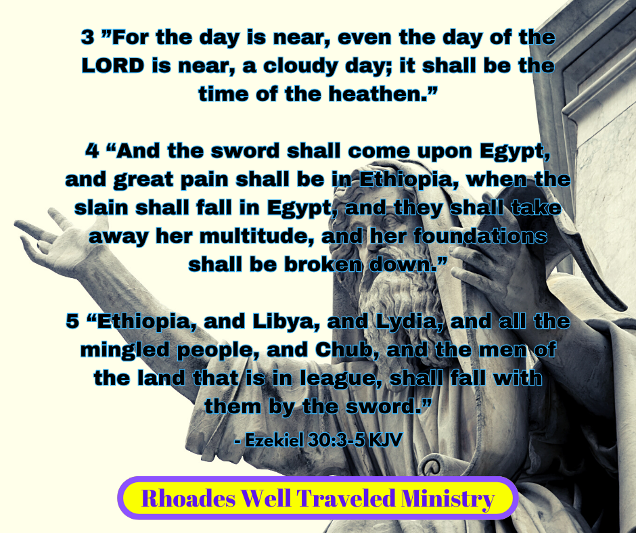GOD'S WORD
▬ Exploring the Communication Between Ezekiel and God ▬
January 30, 2024

Reverend Danny Rhoades
Good day Brothers and Sisters. Today in my Daily Devotional, we are going to be exploring the communication between Ezekiel and God.
Theophany, the manifestation of the divine, has long been a subject of intrigue and debate in religious studies. One biblical figure who experienced profound encounters with God is the prophet, Ezekiel. Through vivid visions and intense interactions, Ezekiel's communication with the divine has captured the attention of scholars and believers alike. However, interpretations of these encounters vary, leading to a fundamental question: were Ezekiel's experiences manifestations of the divine, or were they products of
his own imagination? This article delves into the intriguing debate surrounding the nature of Ezekiel's communication with God, examining the concepts of theophany and imagination, analyzing biblical accounts, exploring different theories, religious interpretations, and philosophical perspectives. By doing so, we aim to shed light on this timeless discussion and its implications for our understanding of spirituality and religious experiences.
Ezekiel, the prophet from the Old Testament, was not your average guy next door. No, this guy had some serious encounters with the divine. He was a contemporary of Jeremiah and was exiled to Babylon along with other Israelites after the fall of Jerusalem. Ezekiel had a reputation for delivering some mind-blowing prophecies and having direct communication with God. But how exactly did he communicate with the Almighty? That's what we're here to find out.
Ezekiel's communication with God holds immense significance in religious and scholarly circles. It not only sheds light on the nature of divine encounters but also offers insights into the relationship between God and His chosen people. The encounters described by Ezekiel are often seen as examples of divine revelation and a means of delivering critical messages to the Israelites. However, there has been a long-standing debate about the nature of these encounters – were they genuine divine manifestations or products of Ezekiel's vivid imagination? Let's delve deeper to uncover the truth.
Theophany, for those not well-versed in theological jargon, refers to the visible manifestation of a deity to a human being. In religious texts, theophanies often symbolize a direct encounter between humans and the divine that transcends the ordinary. These manifestations can take various forms, such as visions, dreams, or physical appearances, and they serve as a means for the divine to communicate with humanity.
Theophanies play a crucial role in religious experiences, providing a tangible connection between the supernatural realm and the human realm. They serve as transformative encounters, awakening a sense of awe, wonder, and fear in those who witness them. Theophanies are often seen as moments of divine revelation, where insights, wisdom, or instructions are imparted to the individual. Such encounters hold the power to shape the beliefs, actions, and destinies of those who experience them.
Ezekiel had a series of mind-boggling encounters with God, which he faithfully recorded in the biblical book that bears his name. These encounters include visions of heavenly beings, bizarre creatures, and a divine chariot known as the "chariot of God." In these encounters, God spoke directly to Ezekiel, revealing prophecies, providing instructions, and granting him insight into future events.
Ezekiel's descriptions of these encounters are nothing short of fantastical. He vividly portrays intricate details of heavenly beings with multiple faces, wheels within wheels, and radiant glory. The prophet's interactions with God are marked by awe, trembling, and obedience. Whether it was the call to prophecy, the vision of the dry bones coming to life, or the measurement of a temple, Ezekiel's encounters with God were undeniably mind-blowing experiences that defy conventional explanation.
Now, let's dive into the debate surrounding Ezekiel's encounters. Some skeptics argue that Ezekiel's experiences can be explained purely as products of his own imaginative mind. They propose that his encounters with God were nothing more than elaborate hallucinations or visions resulting from the extreme stress and emotional turmoil of exile.
While the Imagination Theory offers a possible explanation, it faces strong criticisms from scholars and believers alike. The precise details and consistency of Ezekiel's encounters, as well as their profound impact on his prophecies and the Israelite community, challenge the notion of mere hallucination. Additionally, many argue that attributing these encounters solely to imagination undermines the significance and divine nature of Ezekiel's experiences. The debate rages on, and only further exploration and analysis can bring us closer to understanding the true nature of Ezekiel's divine communication, whether it be an extraordinary theophany or an awe-inspiring product of the human mind.
When it comes to the nature of Ezekiel's communication with God, some scholars and believers subscribe to the Divine Revelation Theory. This theory posits that Ezekiel's encounters were genuine divine interactions, where he received messages directly from God.
According to this theory, Ezekiel's visions and conversations were not mere products of imagination or psychological phenomena but were divine revelations intended to convey God's will and messages to humanity. Supporters of this theory argue that the vivid imagery and symbolic language in Ezekiel's accounts suggest a higher source beyond human comprehension.
Supporters of the Divine Revelation Theory point to several aspects to bolster their argument. Firstly, they highlight the consistency and coherence of Ezekiel's messages over a period of time, suggesting a deliberate and purposeful communication from a divine entity.
Furthermore, they argue that the detailed prophecies and accurate predictions made by Ezekiel add credibility to the notion of divine communication. For instance, Ezekiel foresaw the fall of Jerusalem and the destruction of the First Temple, events that came to pass as prophesied.
Additionally, proponents of the Divine Revelation Theory often emphasize the transformative impact these encounters had on Ezekiel. They highlight how he was inspired to become a messenger and prophet, dedicating his life to relaying God's messages to the people.
While the Divine Revelation Theory provides a convincing explanation for Ezekiel's experiences, it remains a topic of debate and interpretation among religious scholars and skeptics alike.
Within Christianity, interpretations of Ezekiel's communication with God vary. Some Christians view Ezekiel's encounters as literal divine interactions, aligning with the Divine Revelation Theory. They believe that God chose Ezekiel as a prophet and communicated directly with him to deliver important messages.
Others, however, adopt a more symbolic or metaphorical interpretation. They argue that Ezekiel's experiences were visions or dreams conveying spiritual truths rather than literal conversations with a divine being. These interpretations draw on the tradition of using symbolic language and imagery in biblical texts.
In Judaism, Ezekiel holds significant importance as one of the major prophets. Jewish interpretations of Ezekiel's communication with God often lean towards a more literal understanding. Many Jewish scholars and religious authorities maintain that Ezekiel truly received divine messages and that his prophecies hold deep spiritual significance.
However, variations exist within Jewish interpretations as well. Some interpret Ezekiel's encounters as mystical experiences, emphasizing the spiritual and symbolic elements rather than the literal communication with God. This reflects the diverse range of perspectives within the Jewish tradition.
Outside of Christianity and Judaism, Ezekiel's communication with God is interpreted through the lens of different religious traditions. For instance, in Islam, Ezekiel (known as Dhul-Kifl) is considered a prophet, and his communication with God is believed to be genuine divine revelation.
Similarly, in various other religions, Ezekiel's encounters are interpreted according to their specific theological frameworks. These interpretations often align with the belief systems and understandings of divine communication within each respective faith.
Philosophical discussions on divine communication in the context of Ezekiel's experiences delve into the nature of perception and religious experiences. Philosophers debate whether it is possible for humans to experience direct divine communication or if such encounters are shaped solely by individual perception and interpretation.
Some argue that our understanding of reality is limited by our subjective perceptions, suggesting that Ezekiel's communication with God may have been a deeply personal experience rather than an objective reality. Others contend that the existence of a transcendent and all-knowing deity opens the possibility for genuine divine communication.
Epistemology, the study of knowledge and belief, plays a crucial role in evaluating claims of divine communication. Philosophers examine the reliability and justification of accepting Ezekiel's encounters as genuine divine revelation.
Questions arise concerning the criteria for assessing the validity of such claims, the role of personal experience, and the potential influence of cultural and religious biases. These considerations contribute to the ongoing philosophical discourse surrounding the nature of Ezekiel's communication with God.
The debate surrounding how Ezekiel communicated with God continues to be a topic of both theological and philosophical interest. While the Divine Revelation Theory offers a compelling explanation for those who believe in the veracity of Ezekiel's encounters, alternate interpretations emphasize symbolic or metaphorical meanings.
Religious perspectives on Ezekiel's communication vary between different faith traditions, reflecting diverse interpretations within Christianity, Judaism, and other religions. Philosophical discussions further explore the nature of perception, religious experiences, and epistemological considerations related to divine communication.
Ultimately, the ongoing debate surrounding Ezekiel's communication with God has broader implications for our understanding of religious experiences, the nature of divine revelation, and the ways in which individuals perceive and interpret the divine. With no definitive resolution in sight, it remains an intriguing and cherished part of religious discourse and reflection.
Brothers and sisters in conclusion, the nature of Ezekiel's communication with God remains a subject of intense debate. Theological, philosophical, and interpretational perspectives all contribute to contrasting views on whether Ezekiel's encounters were genuine theophanies or products of his imagination. This ongoing discourse not only highlights the complexities of religious experiences but also underscores the significance of individual interpretation and belief systems. Regardless of where one falls on the spectrum, the discussion surrounding Ezekiel's communication with God invites us to reflect on the limits of human understanding, the power of faith, and the enduring quest for divine connection. It reminds us that while the debate may continue, the search for spiritual truth and personal meaning remains an integral part of our shared human journey.
Brothers and Sisters now let's review what we just learned, from today's devotional.
First, we learn that theophany refers to the manifestation or appearance of a deity to a human being. It is considered significant as it represents a direct encounter between the divine and the human realm, often serving as a means of divine communication, revelation, or guidance.
Second, we learn that the imagination theory posits that Ezekiel's experiences were a result of his own imaginative faculties rather than actual encounters with God. Supporters of this theory argue that the visions and interactions described by Ezekiel can be interpreted as symbolic or metaphorical representations of his own thoughts, emotions, or cultural influences.
Third, we learn that proponents of the divine revelation theory believe that Ezekiel's communication with God was genuine and not merely a product of his imagination. They point to the detailed descriptions and vivid imagery in the biblical accounts, the consistency of Ezekiel's experiences with other divine encounters in religious texts, and the profound impact these encounters had on Ezekiel's life and prophetic mission as evidence for the divine nature of his communication.
Fourth, we learn that the ongoing debate surrounding Ezekiel's communication with God has broader implications for religious understanding. It challenges our assumptions about the nature of divine encounters, the limits of human perception, and the subjective nature of religious experiences. It also prompts us to reflect on the role of faith, interpretation, and personal belief systems in shaping our understanding of spirituality and the divine. Ultimately, this debate invites us to engage in a deeper exploration of our own beliefs and the diversity of religious experiences throughout history.
Brothers and Sisters, the concept of theophany is a powerful reminder that God can communicate with us in many ways, and we should always be open to receiving divine guidance. The debate surrounding Ezekiel’s communication with God highlights the importance of faith, interpretation, and personal belief systems in shaping our understanding of spirituality and the divine. As we reflect on these ideas, let us remember that our spiritual journeys are unique and personal, and that we can learn from the diversity of religious experiences throughout history. May we continue to seek wisdom and guidance from God as we navigate our own paths.


Exercise caution in your business affairs; for the world is full of trickery. But let this not blind you to what virtue there is; many persons strive for high ideals; and everywhere life is full of heroism.
Join us in spreading God's love and compassion to those in need.



